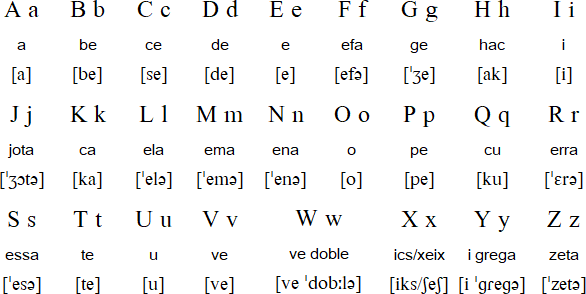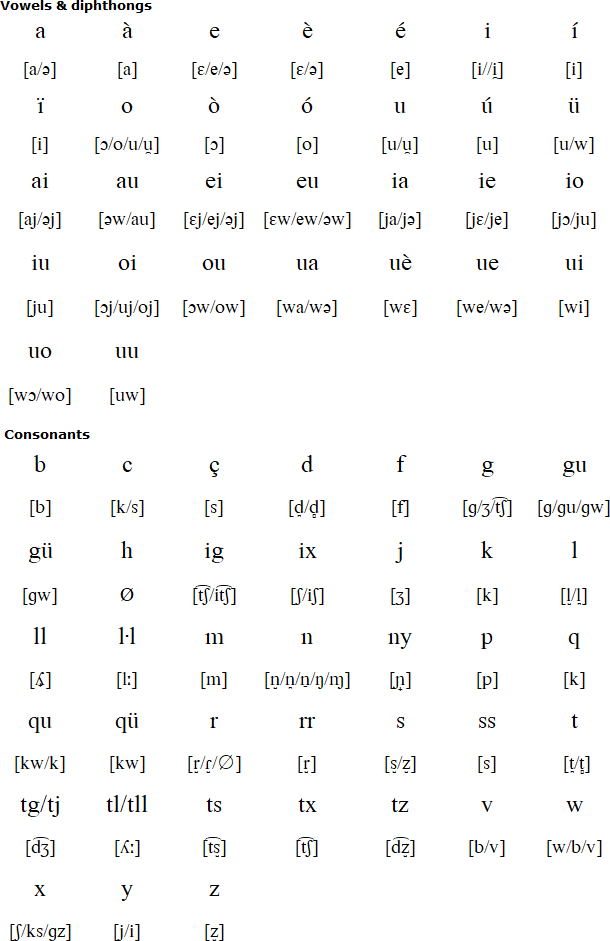Catalan is a Romance language spoken by about 9.5 million people in Spain, Andorra, France and Italy. It is the official language of Andorra, and an official language, along with Spanish, in Catalonia (Catalunya), Valencia (Comunitat Valenciana) and the Balearic Islands (Illes Balears) in Spain. It is also spoken in parts of Aragon and Murcia in Spain, Pyrénées-Orientales in southern France, and in the Sardinian city of Alghero (l'Alguer) in Italy.
The language of Valencia is known as Valencian, which some belief is a separate language, however most linguists view it as a variety of Catalan. The Acadèmia Valenciana de la Llengua (AVL) consider Catalan and Valencian to be two names for the same language.
Catalan appeared as a distinct language during the 10th and 11th centuries. During the 12th century, Catalan began to appear in writing in scientific, philosophical, financial, religious, legal, literary and historical documents. At that time, Latin and Provençal were the preferred languages for literary and philosophical texts.
After the War of the Spanish Succession (1705-1715), Philip V abolished all the government institutions then existing in Catalonia and implemented Spanish laws. Catalan went through various periods of prohibition and repression.
In the 19th century, a period of economic, cultural and national recovery began, known as the Renaixença (Renaissance). Catalan was reborn as the language of literary culture through the Jocs Florals (Floral Games - a poetry contest) and through distinguished figures such as Jacint Verdaguer, Narcís Oller and Àngel Guimerà.
The Renaixença raised awareness of the lack of unity in the use of the language (there was no model for a common written language) and of the need to draw up rules on spelling. The founding of the Institut d'Estudis Catalans (Institute of Catalan Studies) in 1907 led to the language being codified through the publication of Normes ortogràfiques (Spelling Rules) in 1913, the Diccionari ortogràfic (Spelling Dictionary) in 1917, and the Gramàtica catalana (Catalan Grammar) by Pompeu Fabra in 1918.
During the first 30 years of the 20th century, Catalonia went through a period of political fervour, culminating in the recovery of a degree of political power in the Generalitat (the Government of Catalonia) during the 1930s. During the Second Republic (1931-1939), Catalan was restored to its official language status, which it had lost in the 18th century. However, this promising future was checked by the Civil War and its consequences. The use of Catalan in public was forbidden and the language retreated into the home.
Ever since the restoration of democratic institutions, there has been a process to re-establish the use of Catalan. It is now a co-official language, along with Spanish, in Catalonia and the Balearic Islands, and is widely used an everyday language throughout Catalonia, Valencia, Andorrra and the Balearic Islands. Catalan is used as a medium of instruction in many schools. It is also used extensively in the media and in government.

Hear the Catalan alphabet with example words:

Download an alphabet chart for Catalan (Excel)
Some information provided by Michael Peter Füstumum and based on http://www.youtube.com/watch?v=N-OqUeLz0Tg
Tots els éssers humans neixen lliures i iguals en dignitat i en drets. Són dotats de raó i de consciència, i han de comportar-se fraternalment els uns amb els altres.
A recording of this text by Sergi Giménez Palomo from Barcelona
All human beings are born free and equal in dignity and rights. They are endowed with reason and conscience and should act towards one another in a spirit of brotherhood.
(Article 1 of the Universal Declaration of Human Rights)
Information about Catalan | Phrases | Numbers | Family words | Time | Tongue twisters | Tower of Babel | Catalan courses on: Amazon.com and Amazon.co.uk [affilate links]
Information about Catalan
http://en.wikipedia.org/wiki/Catalan_language
https://en.wikipedia.org/wiki/Catalan_orthography
http://ca.wikipedia.org/wiki/Català
http://www.bbc.co.uk/languages/european_languages/
languages/catalan.shtml
http://www.orbilat.com/Languages/Catalan/Catalan.html
Information about Balearic varieties of Catalan
http://en.wikipedia.org/wiki/Balearic_dialect
http://mymenorcavilla.co.uk/the-minorcan-dialect-and-how-it-differs-from-mainstream-spanish/
Online Catalan courses
http://www.parla.cat
https://www.loecsen.com/en/learn-catalan
https://www.duolingo.com/enroll/ca/es/Learn-Catalan
https://polymath.org/catalan.php
https://www.101languages.net/catalan/
Catalan phrases
https://ilovelanguages.org/catalan_phrases.php
https://ielanguages.com/catalan.html
http://www.bbc.co.uk/languages/other/quickfix/catalan.shtml
http://mylanguages.org/catalan_phrases.php
https://wikitravel.org/en/Catalan_phrasebook
GRup Enciclopèdia Catalana
http://www.grec.net
Online Catalan dictionaries
http://www.catalandictionary.org
http://dcvb.iecat.net/
http://diccionaris.cat
http://www.diccionarios.com
http://termcat.cat
http://hyperdic.net
https://sinonims.com
Online radio in Catalan
http://www.catradio.es
http://www.rac1.org
Online Catalan news
http://www.elpuntavui.cat
http://www.vilaweb.cat
http://www.ara.cat
El diari electrònic de referència en català
http://www.e-noticies.com
La literatura catalana a internet
http://lletra.uoc.edu
https://www.contesencatala.com/
Institut Ramon Llull (the official institution representing Catalan culture and language abroad): http://www.llull.cat
Softcatalà - software in Catalan
http://www.softcatala.org
Aragonese, Aranese, Aromanian, Asturian, Catalan, Corsican, Dalmatian, Emilian-Romagnol, Extremaduran, Fala, Franco-Provençal, French, Friulian, Galician, Gallo, Gascon, Genoese, Guernésiais, Istro-Romanian, Istriot, Italian, Jèrriais, Ladino, Ladin, Ligurian, Lombard, Lorrain, Megleno-Romanian, Mirandese, Moldovan, Monégasque, Mozarabic, Neapolitan, Occitan, Occitan (Auvergnat), Occitan (Languedocien), Occitan (Limousin), Occitan (Provençal), Picard, Piedmontese, Portuguese, Romanian, Romansh, Sardinian, Sicilian, Spanish, Valencian, Venetian, Walloon
Languages written with the Latin alphabet
Page last modified: 16.09.23
[top]
You can support this site by Buying Me A Coffee, and if you like what you see on this page, you can use the buttons below to share it with people you know.

If you like this site and find it useful, you can support it by making a donation via PayPal or Patreon, or by contributing in other ways. Omniglot is how I make my living.
Note: all links on this site to Amazon.com, Amazon.co.uk
and Amazon.fr
are affiliate links. This means I earn a commission if you click on any of them and buy something. So by clicking on these links you can help to support this site.
[top]
Shipping time world-
wide is typically 6 days.